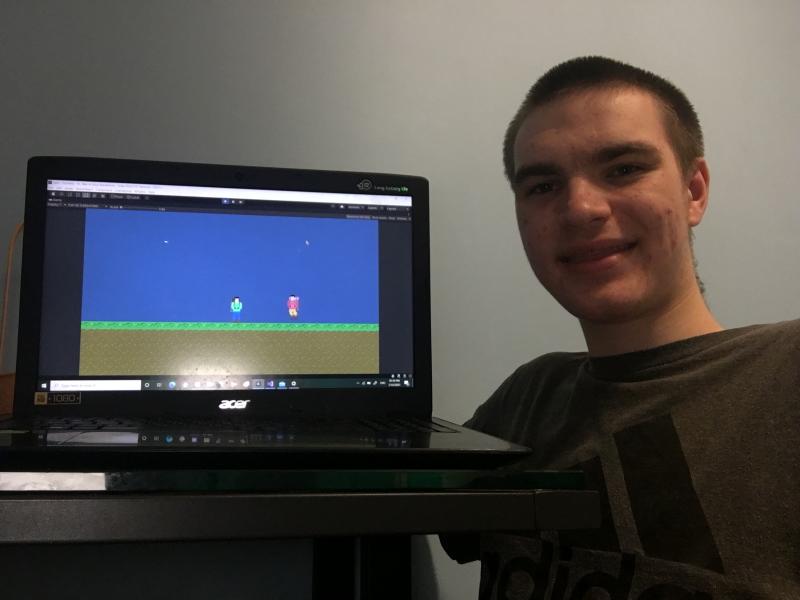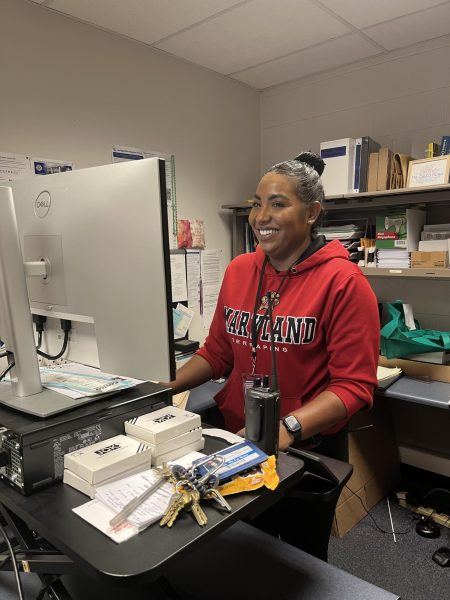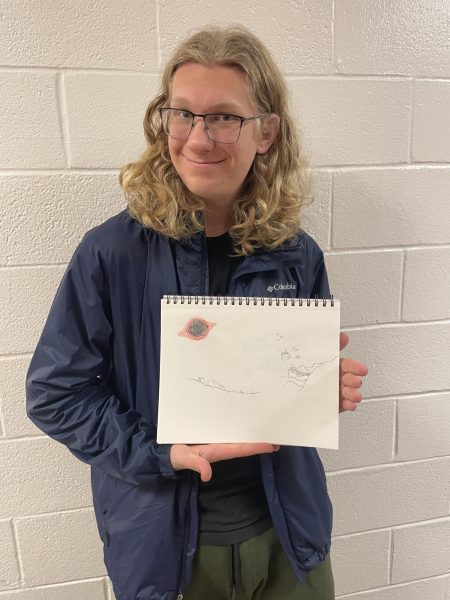Senior Vincent Bornhorst’s game creation; stalled but not abandoned
Photo courtesy Vincent Bornhorst
Senior Vincent Bornhorst shares Echo demo with his family on Christmas.
Unity has a different meaning to different people. As the Christmas season was coming up, unity meant gift giving and gathering as a family. For senior Vincent Bornhorst, Unity is also the name of the computer program he is using to design and create a video game to show his family how much he cares for them.
Echo, Bornhorst’s game, was initially thought up in early October. The game combines platforming elements, trap avoidance, captivating music, mood lighting, intriguing levels and character design to create a well-thought-through atmosphere. He came up with an idea to prove that he could make something he failed to accomplish in prior attempts. “I have always really wanted to create a game. I have tried it before and they all failed, so I wanted to create an actual game that I would be proud of,” Bornhorst said.
Sticking with a project can be difficult, but Bornhorst has a reason to stay with this one to the end, as he would be giving it to his family as a gift. “Usually I would get bored and just stop trying,” but this game will be for, “basically everyone in my family… hopefully not just my parents and siblings,” Bornhorst said.
Bornhorst has told his friends about the project and streams his progress and updates on Discord. He sometimes asks for advice on his concepts and for ideas to fix parts of his code. One of his coding and music friends, Harrang Khalsa, helped him and has been an integral part of the reviewing process. Bornhorst was having trouble with running his “movement code and how to implement it,” Khalsa said.
Bornhorst applied his creativity to both his music and his character’s movement controls. One thing that makes Bornhorst’s game unique is the interesting game mechanic that allows players to jump off of, “a ball that you throw outwards,” which is slightly similar in practice to jumping on a koopa shell in Mario games, although, in Bornhorst’s game, this projectile is not affected by gravity and is the primary element in navigating the terrain. The ball bounces in a similar manner to sound waves and has the added effect that in the few dark level stages, “[the ball] lights up [the area],” Khalsa said.
The schedule and time frame of having Echo done by Christmas gave Bornhorst motivation to work on it, when he had the time between his course load and college applications. On the downside it seemed like there was a, “50-50 chance it [would] be done by Christmas,” Bornhorst said.
One of the main areas that Bornhorst spent his time was tinkering with the music he created on the program, Musescore, as making the music is one of his favorite parts of the game-making process. “Vincent’s music is amazing. I am not going to lie, he spends so much time and effort on his music it is kind of insane. I know he jokes about how he is procrastinating level design for making music, but honestly I think that the feel of the game, which his music contributes to, adds more [to the game] than having a lot of levels,” Khalsa said.
The game-making process isn’t always easy and, despite having four years of high school programming courses under his belt, Bornhorst has to, at times, look up tutorials online when coding in Unity’s language C#. He was designing ways to create levels and had to learn new and different processes, “I experimented with new lighting ideas, which I hadn’t done before,” Bornhorst said.
All the effort to create a game, however, was not wasted because the elements of the project come together to form a work of great skill, “The music really provides a sense of atmosphere. It fits really well with the game,” Khalsa said.
Your donation will support the student journalists of Thomas S. Wootton High School. Your contribution will allow us to purchase equipment and cover our annual website hosting costs.
Jason Goode is a 2021 graduate.







